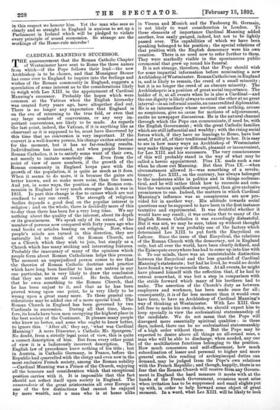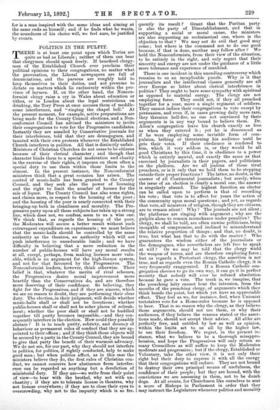CARDINAL MANNING'S SUCCESSOR. T HE announcement that the Roman Catholic Chapter
of Westminster have sent to Rome the three names from which—if the Pope follows their lead—the new Archbishop is to be chosen, and that Monsignor Stonor has come over to England to inquire into the feelings and wishes of the Roman community in England, suggests a speculation of some interest as to the considerations likely 'to weigh with Leo XIII. in the appointment of Cardinal Manning's successor. Probably the hopes which were -common at the Vatican when the English hierarchy was created forty years ago, have altogether died out. There is no longer any expectation that England is on the eve of returning to the true fold, or even that any large number of conversions, or any very im- portant conversions, are likely to be made. As regards the last point, indeed, the Vatican, if it is anything like as observant as it is supposed to be, must have discovered by this time that no conversion is very important. If the tonvert is a well-known person, his change excites attention for the moment, but it has no far-reaching results. Individualism has increased, and when people become Roman Catholics, it is to satisfy some want of their own, not merely to imitate somebody else. Even from the point of view of mere numbers, if the growth of the Roman community in England keeps pace with the growth of the population, it is quite as much as it does. When it seems to do more, it is because the gains are better known, and so make more noise, than the losses. And yet, in some ways, the position of the Roman com- munion in England is very much stronger than it was in 1851. In part this change is due to causes which are not -confined to any one creed. The strength of religious bodies depends a good deal on the popular interest in religion ; and on the whole, there is decidedly more of this 'to-day than there has been for a very long time. We say nothing about the quality of the interest, about its depth or its genuineness. We speak only of its extent, of the number of persons now compared with forty years ago who lead books or articles bearing on religion. Now, when people's minds are turned in this direction, they are naturally led to think of the Roman Church, not as a Church which they wish to join, but simply as a Church which has many striking and interesting features. Probably the inaccuracy of many of the opinions which people form about Roman Catholicism helps this process. The moment an unprejudiced person comes to see that the theories of Roman Catholic doctrine and practice which have long been familiar to him are untrue in any one particular, he is very likely to draw the conclusion that they are untrue all round. He feels, therefore, 'that he owes something to the Roman Church, that he has been unjust to it, and that as he has been proved wrong upon one point, he is very likely to be wrong upon a great many more. To these general con- siderations may be added one of a more special kind. The Roman Church in England has been governed by two Cardinals in succession. During all that time, there- fore, its heads have been men occupying the highest place in the best society of the Continent. It pleases many people who know no better, and some who ought to know better, to ignore this. ' After all,' they say, what was Cardinal Manning? A mere Dissenter, a Catholic Mr. Spurgeon.' No doubt, from a strictly legal point of view, this is quite a correct description of him. But from every other point of view it is a ludicrously incorrect description. The English law of precedence knew nothing of his title ; but in Austria, in Catholic Germany, in France, before the Republic had quarrelled with the clergy and even now in the most exclusive French society, among the Roman nobility —Cardinal Manning was a, Prince of the Church, enjoying all the honours and consideration which that exceptional position carries with it. It is impossible that this fact should not reflect itself upon society in England. The camaraderie of the great aristocracies all over Europe is one of the few distinctions that cannot be enjoyed by mere wealth, and a man who is at home alike in Vienna and Munich and the Faubourg St. Germain, is not likely to want consideration in London. To these elements of importance Cardinal Manning added another, less easily gauged, indeed, but not to be lightly passed over. The capabilities of which we have been speaking belonged-to his position ; the special relations of that position with the English democracy were his own creation. There is no need now to refer further to them. They were markedly visible in the spontaneous public ceremonial that grew up round his funeral.
It is not strange, therefore, that the Pope should wish for some impartial information before nominating a new Archbishop of Westminster. Roman Catholicism in England is, and is likely to remain, the creed of a small minority ; but it is no longer the creed of an obscure minority. The Archbishopric is a position of great social importance. The holder of it, at all events when he is also a Cardinal—and the one dignity is likely always to entail the other at no great interval—is an informal nuncio, an unaccredited diplomatist.
He is an intermediary whose services cost nothing, arouse no suspicions, give no cause for motions of adjournment, excite no newspaper discussions. He is the natural channel through which the Pope can communicate, if need be, with the English Government ; with the great Catholic families which are still influential and wealthy; with the rising social forces which, if they have no leanings to Rome, have lost most, if not all, of their traditional hostility to her. It is easy to see in how many ways an Archbishop of Westminster may make things easy or difficult, pleasant or inconvenient, for Leo XIII. and his successors. The very consciousness of this will probably stand in the way of what may be called a heroic appointment. Pius IX. made such a one when he chose out Manning. But then Pius IX.—when circumstances allowed it—was something of a revolu- tionary. Leo XTTT., on the contrary, has always belonged to the moderates alike in politics and in things ecclesias- tical, and he will rather think how to reconcile and com- bine the various qualifications required, than give exclusive prominence to one. Indeed, the matters in which Cardinal Manning's influence was so conspicuous are now pro- vided for in another way. His attitude towards social questions may be supposed to have been in the first instance tentative and experimental. It was doubtful whether it would have any result ; it was certain that to many of the English Roman Catholics it was exceedingly distasteful. But it was not, we may be sure, taken up without thought and study, and it was probably one of the factors which determined Leo XIII. to put forth the Encyclical on Labour. Since the issue of that Encyclical, the relations of the Roman Church with the democracy, not in England only, but all over the world, have been clearly defined, and the Episcopate everywhere has had to come up into line with it. To our minds, there was an unmistakable distinction between the Encyclical and the less guarded of Cardinal Manning's statements ; but had he lived, he would no doubt have found a way to reconcile them. At all events, he might have pleased himself with the reflection that, if he had to retreat somewhat, it was but a step in comparison with the stride forward which many of his brethren had to make. The assertion of the Church's duty as between employers and workmen, has been made once for all ; consequently, it is of far less moment than it would once have been, to have an Archbishop of Cardinal Manning's way of thinking at Westminster. With Leo XIII. thus left free to make his own choice, we should expect him to keep specially in view the ecclesiastical statesmanship of the candidate. We do not mean that the Pope will disregard more essentially spiritual qualities : in these days, indeed, there can be no ecclesiastical statesmanship of a high order without them. But the Pope may be expected to desire above all things an all-round man, a man who will be able to discharge, when needed, any one of the multifarious functions belonging to the position. How much concession and self-effacement, how much subordination of lesser and personal to higher and more general ends, this reading of archiepiscopal duties can demand, may be judged from the Pope's own relations with the French Republic; and though, happily, there is no fear that the Roman Church will receive from any Govern- ment in England the hard measure it meets with at the hands of the French Government, occasions must arise when irritation has to be suppressed and small slights put up with, in order to help forward some object of great moment. In a word, what Leo XIII. will be likely to look for is a man inspired with the same ideas and aiming at the same ends as himself ; and if he finds what he wants, the soundness of his choice will, we feel sure, be justified by events.



































 Previous page
Previous page